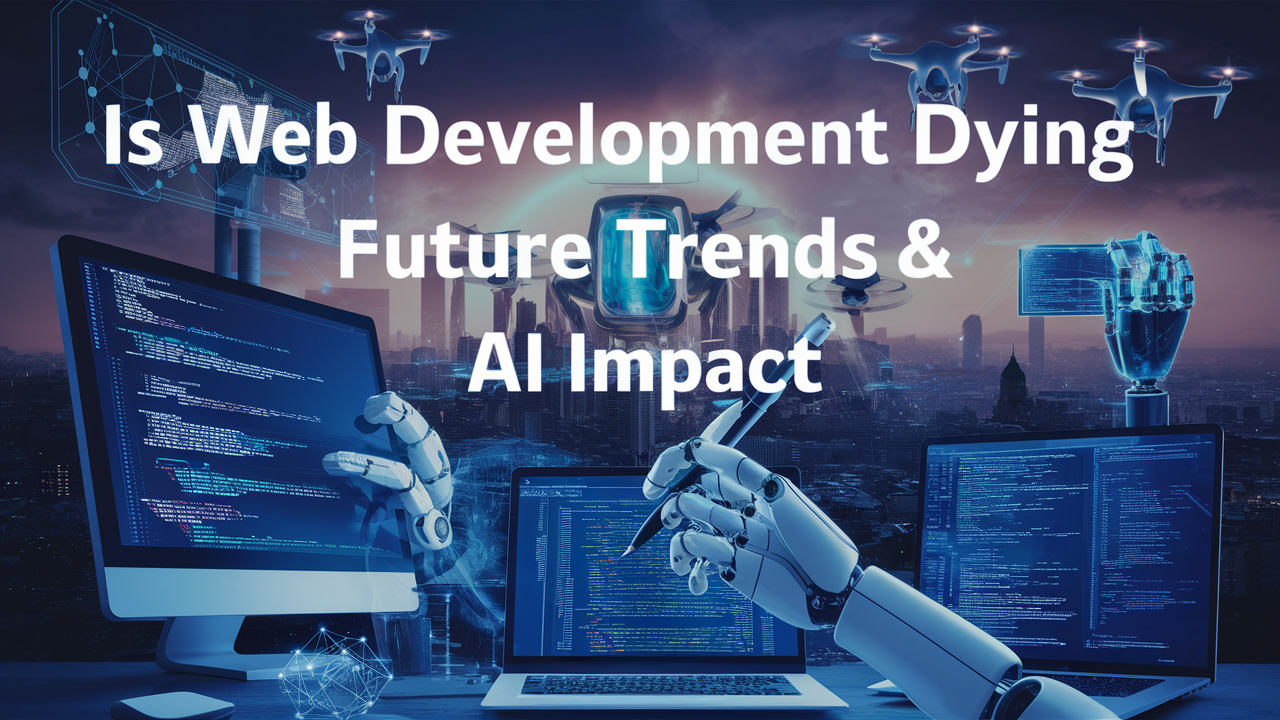Is Web Development Dying? Future Trends & AI Impact
Saurabh Kumar - August 18, 2024, 3:06 PM

Artificial intelligence (AI) has been around since the 1950s. Still, it has only recently taken a form that scares millions because of its ability to perform tasks that showcase its exceptional autonomy and accuracy, resembling human intelligence. That's why most queries by people interested in making a career in web development or those who already are in it are hurrying to get an answer to the question, “Is web development dying?”
According to Statista, there were around 200 thousand web developers and digital interface designers in the United States, projected to reach 229 thousand by 2032. That number looks impressive.
In this blog, we dive into the exact reason behind this forecast. This blog is curated with knowledge from experts and leaders in tech with the aim of providing answers to the yes or no and the “why” of it. As John Maxwell rightly said, “ Find your reason, and you will find your way.”
Is Front-End Web Development a Dying Career?
According to U.S. Bureau of Labor Statistics data, web developers’ employment is projected to grow by 16% from 2022 to 2032. With new tools and frameworks emerging, a vast change has occurred in how user interfaces are built. Technologies like React, Angular, and Vue.js help create dynamic and responsive user interfaces, thus improving performance and processes. Additionally, websites and applications are built quickly with no-code and low-code platforms, which are based on minimal coding. But this, too, helps complement the traditional coding skills.
Also Check: - Backend Development Services in USA
The Role of HTML, CSS, and JavaScript
There is a lot of conversation around HTML and CSS, and the internet is flooded with questions like, “Are HTML and CSS worth learning in 2024?” HTML, CSS, and Javascript are essential requirements for building and styling web pages and are core to front-end development. While HTML provides the structure and content and defines the layout and elements like headings, paragraphs, and links, CSS allows developers to control the visual part of web content. JavaScript caters to the interactive and dynamic features of the website. All three have evolved and incorporated new elements and attributes to amplify functionality and semantic clarity, designing aesthetics and user interactivity.
Demand for Front-end Developers
With digital-first being a strategy for most businesses and organizations and website being a core representation of brand presence online, skilled front-end developers will always be in demand across industries including e-commerce, healthcare, finance, entertainment, and more.
Organizations seek differentiated websites and a skilled talent pool of developers with expertise in the latest tools, frameworks, and industry best practices to work on innovative projects. Top-notch user experience drives organizations towards investing in front-end development and website developers so that their website is engaging with the end-user, hence driving demand for front-end expertise.
How AI Is Shaping the Future of Web Development
There is a lot of noise around web developments going irrelevant crops from AI's disruption across industries. According to McKinsey, by 2030, gen AI could automate up to 29% of total hours worked in the New York region. However, the same report says that this doesn’t mean the area will lose jobs; instead, it will accelerate a shift to a new way of working for many.
So, Is web development dying because of AI? Not!
So here’s what all the noise about AI in web development is about. With AI tools, code generation can be automated, testing can be done efficiently by generating code snippets, and auto-completion of code based on context becomes easier. Additionally, its capability for bug detection, performance, and regression testing optimizes the development process.
So, is AI a panacea? Not really. AI can be an aid or an assistant that helps website developers speed up time to market and allows developers to focus on more strategic and creative tasks, such as designing, troubleshooting, and problem-solving.
Will AI Replace Web Developers?
The human versus machine debate has been going around for decades. However, the answer to this still stems from the primary factors that set humans apart: creativity, emotional quotient (Q), and intuition of human developers.
AI can automate redundant tasks and help to code, but in the end, complex problem-solving and decision-making require human intelligence. Accurate interpretation of requirements and arriving at precise solutions adhering to technical constraints involve the expertise of human website developers.
The Challenges with AI: AI cannot comprehend context and user requirements as well as humans and often needs an understanding of the core objectives or end-use goals. Since AI is trained on existing data and patterns, the results produced cannot be original, thus making it impossible to replicate the ingenuity of the human brain. There have been ongoing conversations about AI’s biases and lack of ability to make judgments, thus making AI more of an aid or accomplice than a replacement.
AI as an Assistant: AI can surely assist developers by automating tasks, thus allowing them to focus on more complex tasks. Additionally, it can provide insights with its analytical power. It can be used as a tool for collaboration in problem-solving. Still, it can’t mirror human creativity and problem-solving, which are the critical components of the web development process.
Also Read: - Is Software Development Hard to Learn
The Future of Web Development Careers: Still Promising?
Developers who stay up-to-date with the latest frameworks and technologies will continue to thrive in the growing market. Proficiency in HTML, CSS, and JavaScript, along with expertise in frameworks and libraries like React, Angular, and Vue.js and knowledge of Node.js, Python (Django, Flask), Ruby on Rails, and PHP, are necessary 21st-century skills needed for a highly paid web development career.
Growing skills in front-end, back-end, UI/UX design, and best practices for web security can open up windows of opportunities in the competitive world where every add-on skill increases demand. According to Blue Corona, 73% of companies are investing in web design to differentiate their brands.
E-commerce, healthcare, financial sector, education, media, and entertainment industries need robust, secure, user-friendly platforms and specialized web development expertise. Software-as-a-service (SaaS) providers continually seek competent developers who can add value to their applications, platforms, and tools.
How Emerging Technologies Will Influence Web Development
With organizations moving towards Augmented Reality (AR) and Virtual Reality (VR), web developers need in-depth knowledge of specialized skills and tools. As IoT connects physical devices to the internet, new data security and privacy challenges become common, and developers must upskill themselves to ensure that the website can stay safeguarded against potential vulnerabilities and protect sensitive information.
Next-gen technologies like holographic displays are showing potential to change how we experience user interactions, and the rise of Progressive Web Apps (PWAs) and 5G technology is accelerating the pace of development in website development and bridging agile, reliable, and immersive web experiences.
Developers must stay on the learning curve, stay up-to-date with the latest tools and frameworks designed to work with AR/VR aoT, and explore innovative ways to incorporate AR/VR into their projects. Additionally, web developers must learn techniques to provide appropriate security measures against emerging threats. Continuous learning and adaptation will be the key to a successful web development career.
Web Development in the Age of Automation
Automated code generation and deployment have become more prevalent, as have automated testing frameworks and tools. With modern CMS platforms that automate template generation, content scheduling, and SEO optimization, the load on developers to maintain and update websites has been reduced.
Does this mean web developers will lose their relevance? Not quite. Web developers must develop proficiency in programming languages and scripting such as JavaScript, Python, and Ruby to customize and extend automated solutions.
Knowledge of next-gen practices like DevOps will help developers integrate automation into their workflows effectively while developing data analysis and visualization skills to facilitate accurate interpretation of performance metrics, user behavior, and other data for informed decision-making.
The Path Ahead in Web Development
There is no escape from staying informed about the advancements in automation tools, technologies, and best practices for developers. Continuous learning involving enrollment in courses, certifications, and industry conferences while using automation to improve productivity and efficiency can help developers stay relevant and be at the forefront of the industry. There is no way that web development is dying; it is here to wait more than ever.






